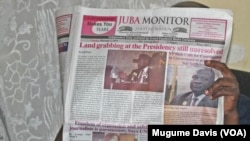WASHINGTON, D.C. —
A U.S. rights group warned this week that media repression is casting a chill over free speech in South Sudan, where a writer who was critical of the government in Juba was killed several months ago.
Sonni Efron, a Senior Government Fellow at Human Rights First, said attacks on journalists, such as the unsolved killing in December of political commentator Isaiah Diing Abraham Chan Awuol, who frequently criticized the South Sudanese government in his writing, have a "chilling effect" on citizens' access to information.
“These attacks and murders of journalists have a profound, chilling effect on the free flow of information that is so important to all countries, but especially to the development of a new democracy like South Sudan,” Efron said.
Five months after Diing's murder, police have still made little progress in their investigation, and no one has been arrested in connection with the killing.
Efron warned that, with media moving online and onto mobile devices, some governments could look for new ways to block access to information.
“Digital repression is really a threat in a range of ways that haven’t been fully recognized yet," she said.
Instead of obstructing citizens' access to news, governments, including South Sudan's, should work with information consumers and producers to develop an atmosphere "where journalists can practice their profession without fear of repression or attack or, God forbid, even murder..."
"It’s going to be, of course, useful to the South Sudanese people but it’s also going to be good for South Sudan’s position in the world,” she said.
Human Rights First last week teamed up with the U.S. State Department to launch the Free the Press Campaign, aimed at raising awareness of the importance of media freedom worldwide ahead of World Press Freedom Day, which fell on Friday.
The United Nations Educational, Scientific and Cultural Organization (UNESCO) has designated May 3 as World Press Freedom Day to shine a spotlight on violations of press freedom and to pay tribute to journalists who have lost their lives in the line of duty.
According to the Committee to Protect Journalists, 70 journalists were killed in direct relation to their work in 2012, and of that number, 32 were murdered. The organization says it was one of the deadliest years on record for reporters.
Under Secretary of State for Public Diplomacy and Public Affairs Tara Sonenshine has called on governments around the world to make developing and supporting independent journalism a top priority.
“Just as you need an enabling environment for economic growth or for democratic transition, you need an enabling environment for media development,” she said.
Sonenshine said media freedom isn’t just important – it’s necessary.
“Information is as basic to me as water and air because without it, you are trapped,” she said.
Sonni Efron, a Senior Government Fellow at Human Rights First, said attacks on journalists, such as the unsolved killing in December of political commentator Isaiah Diing Abraham Chan Awuol, who frequently criticized the South Sudanese government in his writing, have a "chilling effect" on citizens' access to information.
“These attacks and murders of journalists have a profound, chilling effect on the free flow of information that is so important to all countries, but especially to the development of a new democracy like South Sudan,” Efron said.
Five months after Diing's murder, police have still made little progress in their investigation, and no one has been arrested in connection with the killing.
Efron warned that, with media moving online and onto mobile devices, some governments could look for new ways to block access to information.
“Digital repression is really a threat in a range of ways that haven’t been fully recognized yet," she said.
Instead of obstructing citizens' access to news, governments, including South Sudan's, should work with information consumers and producers to develop an atmosphere "where journalists can practice their profession without fear of repression or attack or, God forbid, even murder..."
"It’s going to be, of course, useful to the South Sudanese people but it’s also going to be good for South Sudan’s position in the world,” she said.
Human Rights First last week teamed up with the U.S. State Department to launch the Free the Press Campaign, aimed at raising awareness of the importance of media freedom worldwide ahead of World Press Freedom Day, which fell on Friday.
The United Nations Educational, Scientific and Cultural Organization (UNESCO) has designated May 3 as World Press Freedom Day to shine a spotlight on violations of press freedom and to pay tribute to journalists who have lost their lives in the line of duty.
According to the Committee to Protect Journalists, 70 journalists were killed in direct relation to their work in 2012, and of that number, 32 were murdered. The organization says it was one of the deadliest years on record for reporters.
Under Secretary of State for Public Diplomacy and Public Affairs Tara Sonenshine has called on governments around the world to make developing and supporting independent journalism a top priority.
“Just as you need an enabling environment for economic growth or for democratic transition, you need an enabling environment for media development,” she said.
Sonenshine said media freedom isn’t just important – it’s necessary.
“Information is as basic to me as water and air because without it, you are trapped,” she said.
